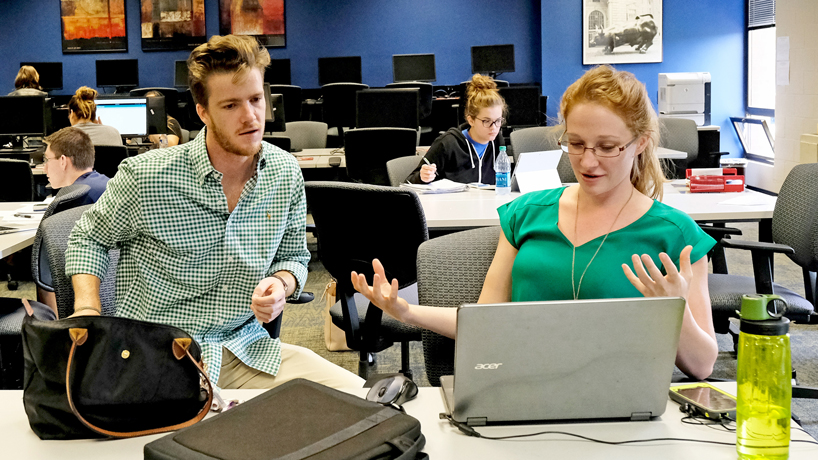
Students can begin enrolling in a new Bachelor of Science in Data Science in Analysis program, an interdisciplinary degree program with emphasis areas in biology, computer science, economics, mathematics, social science and supply chain analytics. (Photo by August Jennewein)
Data is everywhere in the digital world, and it’s helping drive decision-making in organizations across every industry.
Employers have a need for workers who understand how to make sense of it all and apply that insight to action.
The University of Missouri–St. Louis has launched a Bachelor of Science in Data Science and Analysis degree program to help students get the knowledge and skills they need to understand and analyze data in their chosen field.
The interdisciplinary program, recently approved by the Missouri Department of Higher Education and Workforce Development, includes emphasis areas in biology, computer science, economics, mathematics, social science and supply chain analytics. Students can begin enrolling in the program in the fall semester.
“Data scientists and analysts are those people in an organization who can transform a sea of data into insights that help their organization solve difficult problems,” said Jim Craig, the associate dean for interdisciplinary studies and strategic initiatives in UMSL’s College of Arts and Sciences. “As our regional economy changes, the local demand for data science-savvy employees is moving from the master’s level to the bachelor’s level. Because UMSL is the leader in providing college-educated employees for the region, it makes sense that we provide this degree option for our students and the community. I am excited that we are the first in the University of Missouri System to do so.”
Andrew Kersten, dean of the College of Arts and Sciences, initiated discussions with Professor Anne Winkler, chair of the Department of Economics, and Teaching Professor Michael Allison, the department’s assistant chair, about creating the new program before the start of the COVID-19 pandemic.
Winkler and Allison had observed students from other majors enrolling in data and analysis-centric courses such as geospatial analysis, cost-benefit analysis and econometrics offered by the Department of Economics, so they believed there would be student interest.
They’d already worked with colleagues in the Department of Math and Statistics and the Department of Finance and Legal Studies to launch an interdisciplinary Bachelor of Science in Actuarial Science degree program in 2018. They also knew of other data-oriented courses offered by the Department of Computer Science and the Department of Supply Chain and Analytics.
“A lot of data science instruction and knowledge was already there,” said Winkler, noting that no courses had to be created for the new degree. “This program is an interdisciplinary way to pull those courses together.”
Students pursuing the BS-DSA will take 18-20 credit hours of core courses in mathematics, computer science and statistics and will then enroll in a series of courses totaling 18-31 hours in their chosen emphasis area, providing them with analysis and application skills for that domain.
“It’s a BS in Data Science and Analysis,” Winkler said. “And the reason ‘and analysis’ is so important is that this degree program focuses on applying the data science skillset to a foundational body of knowledge. That’s key. They’re going to be analyzing real world problems and issues. I think that will really benefit our students and employers in the St. Louis region.”
The structure of the program should allow interested students to easily pursue additional minors, certificates or even a second major.
Possible careers for quantitative and technology-savvy students could include data scientists, data engineers, analysts, imagery analysts and project managers in everything from business and economics to health, technology, government or nonprofit organizations. The U.S. Bureau of Labor Statistics predicts the number of jobs in data science will increase by 28% through 2026, resulting in roughly 11.5 million new jobs nationwide.














